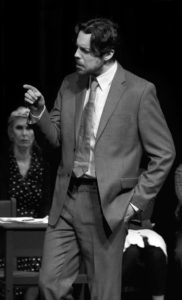To Kill a Mockingbird: Turgid show with one fine performance

To Kill a Mockingbird By Christopher Sergel, Based on the novel by Harper Lee. Ottawa Little Theatre Directed by John Collins
Let’s begin with a word to the several people who left the Ottawa Little Theatre production of To Kill a Mockingbird during the intermission.
Act II was considerably better than the turgid Act I. This is primarily because of one outstanding performance. Marcus Jones is totally believable as Tom Robinson, the innocent black man accused of raping an illiterate white woman. Despite yeoman efforts by some of the other cast members, most notably Barbara Kobolak as Miss Stephanie, no performances other than Jones’ are anywhere near as moving as they should be given the subject matter.
Christopher Sergel’s 1991 adaptation of Harper Lee’s 1960 Pulitzer prize-winning novel about racism in 1935 small-town Alabama (which he apparently took two decades to write) is true to the original. In fact, it frequently quotes Lee’s text. However, it is always a massive challenge adapting a dense novel to the stage. In addition, a large-cast, multi-race play is difficult to cast and ensure a consistently credible ensemble. Sadly, director John Collins has been able to stretch very few of the cast into powerful performances in this production.
The theme of the novel, timely when it was published during the height of the Civil Rights Movement in the U.S., remains germane today, especially since the last presidential election. But the format is heavygoing and many of the characters in the stage version come over as stereotypes or sketches rather than as individuals.
Like the novel, Sergel’s play is presented from the point of view of Jean Louise ‘Scout’ Finch, the young daughter of Atticus Finch, the lawyer assigned to defend Robinson. He knows before he begins that the chances of a black man being found innocent by a white jury in a southern state in the Depression era are slim to non-existent. But Finch’s efforts are as much to educate his children about right and wrong as to fight for an innocent man.
The best-known version of To Kill a Mockingbird is the 1962 movie starring Gregory Peck. His Oscar-winning performance makes it extremely difficult for even a competent actor — and David Holton, who plays Atticus in the OLT production, is definitely that — to be seen as anything but the man playing the Peck role. He works hard. He is fluent and understands the character well, but, even in the central soliloquy, he does not raise the emotional temperature sufficiently.
The children, Scout (Meghan Docanto-Primeau), her big brother Jem (Gavin Blackburn) and their friend Dill (Jacob Segreto) — the last Lee is said to have based on her neighbour Truman Capote — would all be more effective if they had been directed not to gabble their lines and to articulate more clearly.
The set, designed by Klaas Van Weringh, works part of the time but the important courtroom scene is conceptually awkward. This production of To Kill a Mockingbird is ambitious, but, most of the time, it is as dull as the grey of the main set colour.
To Kill a Mockingbird continues at Ottawa Little Theatre to March 4.
Director: John Collins
Set: Klaas Van Weringh
Sound: Brian Cano
Costumes: Peggy Laverty
Cast:
Scout……………………………………..Meghan Docanto-Primeau
Calpurnia…………………………………Linda Nourse
Miss Maudie……………………………..Barbara Kobolak
Miss Stephanie…………………………..Angela Pelly
Judge Taylor/Mr. Cunningham…………..Sam Hanson
Heck Tate………………………………..Bernie Horton
Mrs. Dubose……………………………..Lorilee Holloway
Jem……………………………………….Gavin Blackburn
Reverend Sykes………………………….Michael Wright
Mayella Ewell……………………………Lejla Jasarevic
Bob Ewell………………………………..Matt Easterbrook
Dill……………………………………….Jacob Segreto
Nathan Radley/court clerk………………Keith Colbourne
Atticus Finch……………………………..David Holton
Tom Robinson……………………………Marcus Jones
Choir and court spectators……………….Faduma Warsame, Amanuel Abebe,
Jasmine Wallace-Harder
Boo Radley/Mr. Gilmer………………….Maxime Thibault